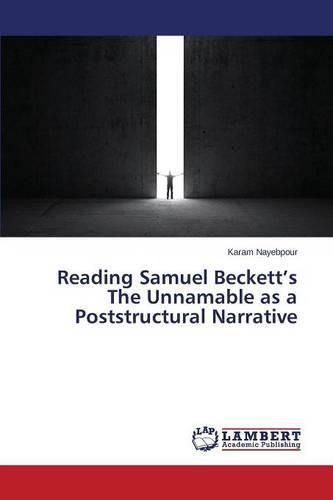Readings Newsletter
Become a Readings Member to make your shopping experience even easier.
Sign in or sign up for free!
You’re not far away from qualifying for FREE standard shipping within Australia
You’ve qualified for FREE standard shipping within Australia
The cart is loading…






This title is printed to order. This book may have been self-published. If so, we cannot guarantee the quality of the content. In the main most books will have gone through the editing process however some may not. We therefore suggest that you be aware of this before ordering this book. If in doubt check either the author or publisher’s details as we are unable to accept any returns unless they are faulty. Please contact us if you have any questions.
Questioning lies at the core of Samuel Beckett’s fictional worlds. In The Unnamable, the thinking ability of the Cartesian I is questioned from the very beginning. In this way, any established certainty about self-identity, space (place and time), the Other, and, more importantly, language is questioned. Despite that, the whole narrative reveals an unending desire to go on so that the unnamable narrator or voice might finally find an internal peace, a sense or meaning. What differentiates him from the modernist characters is his ultimate disbelief in language in both rendering an ultimate meaning or signified and communicating his thoughts to the outside world. However, he is not a postmodern absurdist too. Being aware of the true function of language and the ubiquitous presence of the Other, he is still willingly looking for the possible ways in order to define, as well as understand, himself. True that Beckett was not the initiator of philosophical contemplation on human beings’ being and existence, he can undoubtedly be taken as the first writer who addressed the already existing epistemological and ontological questions in highly literary forms.
$9.00 standard shipping within Australia
FREE standard shipping within Australia for orders over $100.00
Express & International shipping calculated at checkout
This title is printed to order. This book may have been self-published. If so, we cannot guarantee the quality of the content. In the main most books will have gone through the editing process however some may not. We therefore suggest that you be aware of this before ordering this book. If in doubt check either the author or publisher’s details as we are unable to accept any returns unless they are faulty. Please contact us if you have any questions.
Questioning lies at the core of Samuel Beckett’s fictional worlds. In The Unnamable, the thinking ability of the Cartesian I is questioned from the very beginning. In this way, any established certainty about self-identity, space (place and time), the Other, and, more importantly, language is questioned. Despite that, the whole narrative reveals an unending desire to go on so that the unnamable narrator or voice might finally find an internal peace, a sense or meaning. What differentiates him from the modernist characters is his ultimate disbelief in language in both rendering an ultimate meaning or signified and communicating his thoughts to the outside world. However, he is not a postmodern absurdist too. Being aware of the true function of language and the ubiquitous presence of the Other, he is still willingly looking for the possible ways in order to define, as well as understand, himself. True that Beckett was not the initiator of philosophical contemplation on human beings’ being and existence, he can undoubtedly be taken as the first writer who addressed the already existing epistemological and ontological questions in highly literary forms.